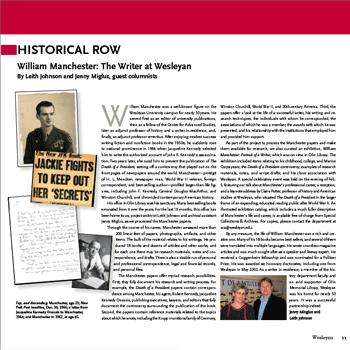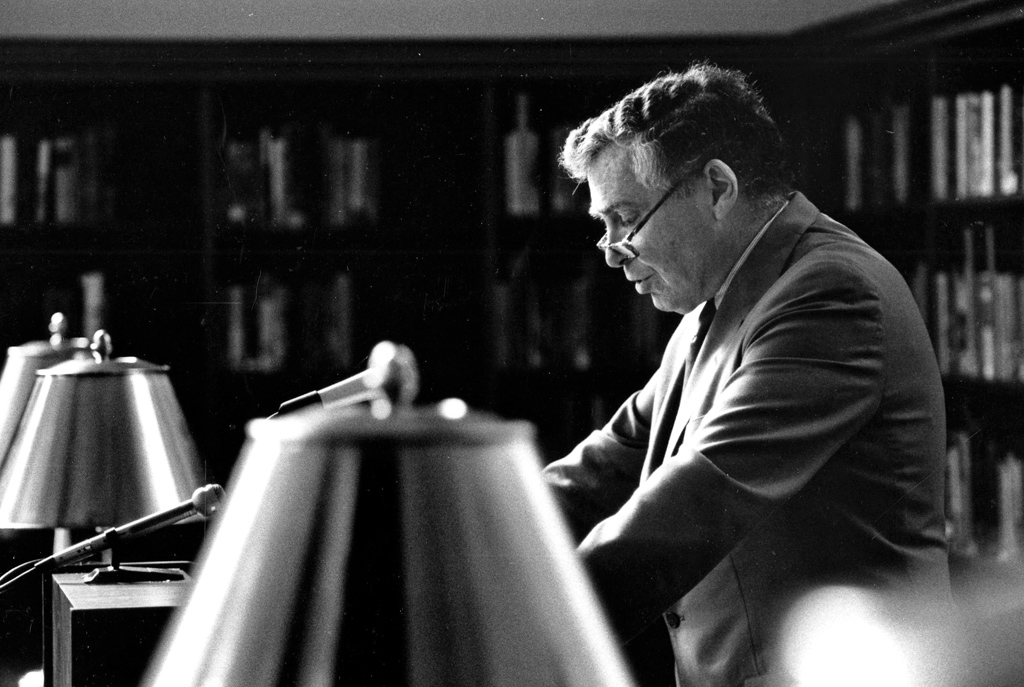HISTORICAL ROW: WILLIAM MANCHESTER, THE WRITER AT WESLEYAN
 William Manchester was a well-known figure on the Wesleyan University campus for nearly 50 years. He served first as an editor of university publications, then as a fellow of the Center for Advanced Studies, later as adjunct professor of history and a writer-in-residence, and, finally, as adjunct professor emeritus. After enjoying modest success writing fiction and nonfiction books in the 1950s, he suddenly rose to national prominence in 1964 when Jacqueline Kennedy selected him to write the authorized account of John F. Kennedy’s assassination. Two years later, she sued him to prevent the publication of The Death of a President, setting off a controversy that played out on the front pages of newspapers around the world. Manchester—protégé of H. L. Mencken, newspaper man, World War II veteran, foreign correspondent, and best-selling author—profiled larger-than-life figures, including John F. Kennedy, General Douglas MacArthur, and Winston Churchill, and chronicled contemporary American history.
William Manchester was a well-known figure on the Wesleyan University campus for nearly 50 years. He served first as an editor of university publications, then as a fellow of the Center for Advanced Studies, later as adjunct professor of history and a writer-in-residence, and, finally, as adjunct professor emeritus. After enjoying modest success writing fiction and nonfiction books in the 1950s, he suddenly rose to national prominence in 1964 when Jacqueline Kennedy selected him to write the authorized account of John F. Kennedy’s assassination. Two years later, she sued him to prevent the publication of The Death of a President, setting off a controversy that played out on the front pages of newspapers around the world. Manchester—protégé of H. L. Mencken, newspaper man, World War II veteran, foreign correspondent, and best-selling author—profiled larger-than-life figures, including John F. Kennedy, General Douglas MacArthur, and Winston Churchill, and chronicled contemporary American history.
His office in Olin Library was his sanctuary. Many best-selling books emanated from it over the years. For the last 18 months, this office has been home to us, project archivist Leith Johnson and archival assistant Jenny Miglus, as we processed the Manchester papers.
Through the course of his career, Manchester amassed more than 200 linear feet of papers, photographs, artifacts, and other items. The bulk of the material relates to his writings. He produced 18 books and dozens of articles and other works, and for each one there may be research materials, notes and correspondence, and drafts. There is also a sizable run of personal and professional correspondence, legal and financial records, and personal files.
The Manchester papers offer myriad research possibilities. First, they fully document his research and writing process. For example, the Death of a President papers contain correspondence among Manchester, his agent, Robert Kennedy, Jacqueline Kennedy Onassis, publishing executives, lawyers, and editors that fully document the controversy surrounding the publication of the book. Second, the papers contain reference materials related to the topics about which he wrote, including the Krupp munitions family of Germany, Winston Churchill, World War II, and 20th-century America. Third, the papers offer a look at the life of a successful writer, his writing and research techniques, the individuals with whom he corresponded, the associations of which he was a member, the awards with which he was presented, and his relationship with the institutions that employed him and provided him support.
As part of the project to process the Manchester papers and make them available for research, we also curated an exhibition, William Manchester: Portrait of a Writer, which was on view in Olin Library. The exhibition included items relating to his childhood, college, and Marine Corps years; the Death of a President controversy; examples of research materials, notes, and script drafts; and his close association with Wesleyan. A special celebratory event was held on the evening of Feb. 5, featuring our talk about Manchester’s professional career, a reception, and a keynote address by Claire Potter, professor of history and American studies at Wesleyan, who situated The Death of a President in the larger frame of an expanding, educated reading public after World War II. An illustrated exhibition catalog, which includes a much fuller description of Manchester’s life and career, is available free of charge from Special Collections & Archives. For copies, please contact the department at sca@wesleyan.edu.
By any measure, the life of William Manchester was a rich and creative one. Many of his 18 books became best sellers, and several of them were translated into multiple languages. He wrote countless magazine articles and was much sought after as a speaker and literary expert. He received a Guggenheim fellowship and was nominated for a Pulitzer Prize. He was awarded six honorary doctorates, including one from Wesleyan in May 2002. As a writer in residence, a member of the history department faculty and an avid supporter of Olin Memorial Library, Wesleyan was his home for nearly 50 years. It was a successful partnership indeed.
-Jenny Minglus and Leith Johnson

